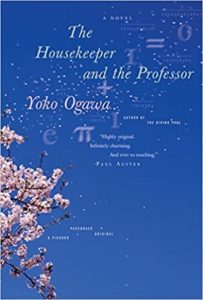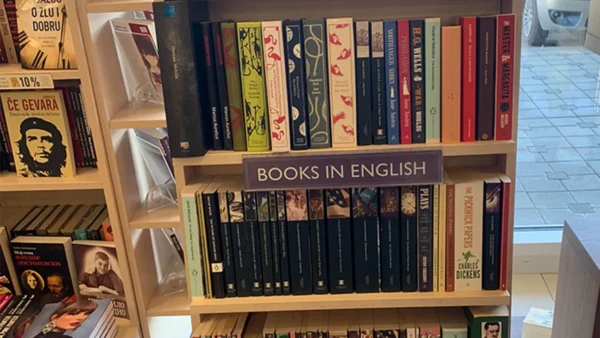How can human relationships be formed without shared memories? Can mathematical order overcome the chaos of a life without memory? Yoko Ogawa’s novel explores these fascinating themes through the simple story of a professor and his housekeeper.
What happens to human relationships when you strip away most of the things we normally think of as being essential to them, like names and shared memories?
The surprising and beautiful answer that Yoko Ogawa gives in her novel The Housekeeper and the Professor is this: they endure.
The professor is an old man whose memory only lasts for 80 minutes. Within that time, he can remember everything normally, but after that, it all slips away. His jacket is covered with little notes reminding him of the essential facts of his life so that he can survive waking up each morning without too much confusion.
When the housekeeper is hired to come each day and cook and clean for him, she must introduce herself each morning as a new acquaintance. The professor has no memory of her from the previous days, so surely forming a relationship will be impossible.
And yet it happens. The professor and the housekeeper (along with her ten-year-old son) begin to form a strange sort of friendship as the weeks and months pass. The housekeeper of course remembers the professor and begins to feel quite attached to him, and the professor, even without memories, seems to show a deeper kind of recognition and affection.
Ogawa doesn’t use names for the novel’s main characters—the housekeeper is the narrator and refers to herself in the first person, while she calls the professor simply “the Professor”. Her son is nicknamed Root because his flat head reminds the Professor of the shape of the square root symbol. The lack of real names also removes another layer of what normal friendships are built on.
The Professor’s subject is mathematics, and he relies on equations and stories about the magic of mathematics to communicate. He also relies on maths to make sense of a chaotic world, to impose his own kind of order on it:
“The mathematical order is beautiful precisely because it has no effect on the real world. Life isn’t going to be easier, nor is anyone going to make a fortune, just because they know something about prime numbers. Of course, lots of mathematical discoveries have practical applications… But those things aren’t the goal of mathematics. The only goal is to discover the truth.”
It’s fascinating to see the unlikely friendship between these three characters developing over the course of the book. For that reason, and for the beautiful ways in which the Professor makes mathematics come alive, I’d recommend it.
I read The Housekeeper and the Professor by Yoko Ogawa for this year’s Japanese Literature Challenge. If you’re interested in Japanese literature, please check out my earlier post on Ms Ice Sandwich by Mieko Kawakami, or read other bloggers’ contributions.





There are 8 comments
This has been on my radar for such a long time. I have even given it as a gift, but have not read it myself. Your review is lovely. I really like the way you describe what it is about. Just makes me want to read it more. I do like Japanese literature (to generalise, but I think you know what I mean.)
Oh, I think this book would make a great gift! The Professor is like the maths teacher we all wish we’d had – he really makes the subject come alive, and I think it’s worth the price of entry for that alone. Add the beautiful story and the interesting premise about memory and friendship, and I’m sure the people who received your gifts were very happy!
This is one of the first works of Japanese literature I ever read, and it remains one of my favorites. The characters formed a family of sorts, and I loved their gentle interactions; the care they showed for one another.
Yes, they are a wonderful set of characters to spend time with, aren’t they? I described it as a friendship, but you’re right, it did feel more like a family. I’m posting a link to your review of this and other Ogawa books, for people who are exploring these comments and want to read more: https://dolcebellezza.blogspot.com/search/label/Yoko%20Ogawa
Lovely review, Andrew. It sounds like the style of Japanese literature I would like – quiet, reflective and beautifully written. I’ve read and enjoyed others books by Ogawa in the past (The Memory Police was terrific), so I’ll definitely keep this in one mind.
Thanks, Jacqui! Yes, I think you’d like it. I went to look up The Memory Police on Goodreads and saw that I already marked it as “to-read” back in April 2020, the same date as your review. So I guess you already convinced me 🙂 Here it is for anyone else who’s reading this and wants to know about the book: https://jacquiwine.wordpress.com/2020/04/10/recent-reads-the-memory-police-square-haunting-excellent-women/
Like WG, I feel like this book has been on my TBR for so long that I almost feel like I’ve read it. But I do like the idea of it waiting for just the right mood, as it seems like a truly satisfying story.
I think it’s a good one to read when things seem a bit bleak elsewhere—the relationships between the three main characters are very heart-warming, and it’s one of those books that leaves you feeling more optimistic about human nature than you were when you started. At least that was my reaction.